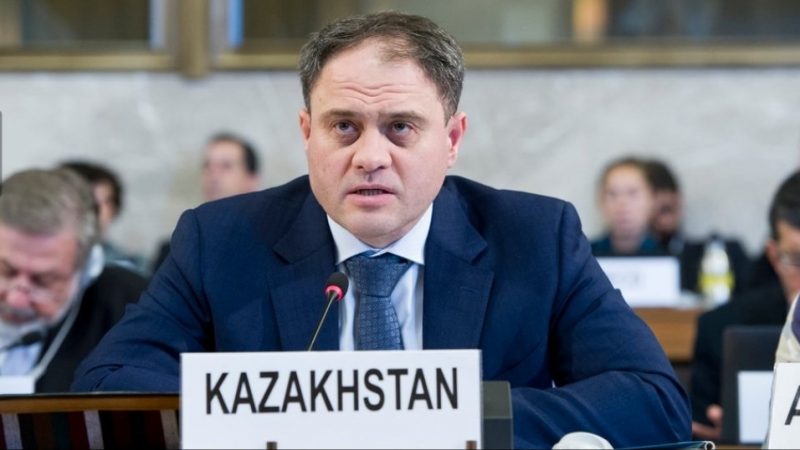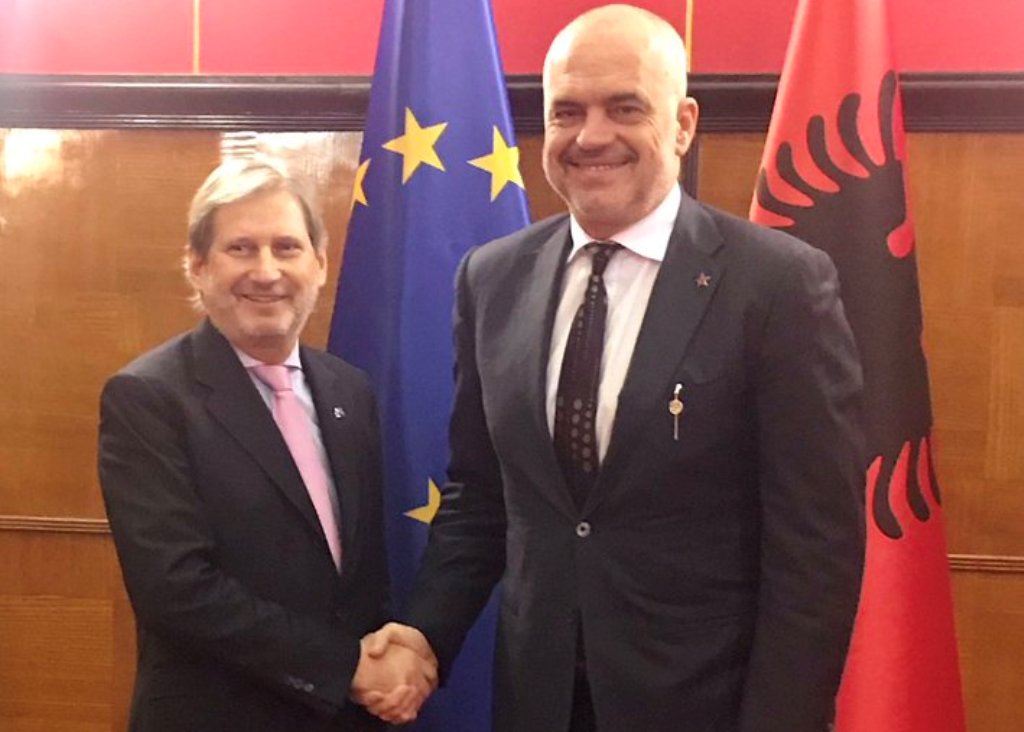
Euractiv (17 January 2019)
A Commission spokesperson, however, was much more cautious and said such relations remain a long-term goal but depend on “political decisions of EU members” and the implementation of the Minsk peace agreement (for Eastern Ukraine).
The EAEU, sometimes called Eurasian Union, was created in 2014 between Russia, Belarus and Kazakhstan, while Armenia and Kyrgyzstan joined the next year. Speaking to EURACTIV, Roman Vassilenko, Kazakhstan’s deputy foreign minister, said EEAs had become a common market with free movement of goods, services, capital and labour.
EAEU is loosely modelled on the EU. The day-to-day work of the EAEU is done through the Eurasian Economic Commission (the executive body), a supranational body similar to the European Commission. There is also a judicial body – the Court of the EAEU.
EURACTIV asked Vassilenko if there were frictions between the advanced status of the EU-Kazakhstan relations, governed by an “Enhanced Partnership and Cooperation Agreement”, and its membership in the EAEU.
The diplomat answered that there was “absolutely no friction”. To the contrary, he argued that Kazakhstan’s EAEU membership and its commitments under EPCA presented “even greater opportunities” not only for Kazakhstan but for the other EAEU members and for the EU.
Fifth anniversary
Asked if he thought it was realistic to expect the establishment of structural relations between the EU and the EAEU, the diplomat stressed that his country strongly and consistently stood for interaction between the two.
He added that in
Vassilenko said that despite some economic difficulties the trade turnover among EAEU countries was growing. In his words, during the first half of 2018, the volume of the
The diplomat argued that the EAEU had effectively become a common market with a population of more than 183 million, which in his words largely operates according to the same transparent rules across several economic areas, including technical and customs and tariff regulation.
“In practice, there is free movement of goods, services, capital and labour between EAEU member states. The EAEU member states work together in the economic sphere, pursuing a coordinated policy in the most important sectors of the economy – energy, industry, agriculture and transport”, Vassilenko said.
He said about 40 countries have officially expressed a desire to develop trade and economic cooperation with the EAEU, after the first free trade agreement, with Vietnam, entered into force in October 2016. In May 2018, an agreement on trade and economic cooperation was signed with China, as well as a temporary agreement leading to the establishment of a free trade zone with Iran.
Further negotiations are underway with Israel, Serbia, India, Singapore and Egypt.
“Thus, the EAEU will soon have a free trade regime with many of the world’s leading developing markets”, the diplomat said.
In particular, he stressed that the EU is
The long-term goal
“The long-term goal of regional interaction between the EAEU and the EU is to create a single economic space from the Atlantic to the Pacific Ocean – a free trade area”, Vassilenko said. He argued that combined, the EAEU and EU had all the necessary prerequisites – complementary economies, geographic proximity and adherence to non-discriminatory trade rules – to unlock powerful and unparalleled economic potential.
“Greater cooperation between the EAEU and the EU will allow for the entire region’s potential to be fully realised, including Central Asia. Moving our region towards the trajectory of dynamic economic growth and away from ideological rifts, would be a universal gain for the EU, China, Russia, the US as well as the world as a whole”, Vassilenko said.
Asked about the effect of EU sanctions against Russia in the context of the Ukraine crisis, Vassilenko said the sanctions regime was not favourable for his country either.
“Undoubtedly, we can all see how damaging such confrontations are for those directly involved but also for those seemingly on the periphery, as they lock conflicting parties into far more adversarial processes. They are not an efficient mechanism for addressing fundamental issues; instead, they cause deeper damage to international relations. This is why we continue to call on all countries to engage in a more meaningful and trustful dialogue”, the Kazakh diplomat said.
EURTACTIV asked a Commission spokesperson if Brussels persisted in its position that developing structural relations between the EU and the EAEU was premature.
“The development of relations between the EU and the EAEU remains a long-term perspective and depends on the political decision of EU member states”, the spokesperson said.
Implementation of Minsk agreement looms large
“The EU is a supporter of regional integration in all areas of the world, but its support is based on the free choice of the participating countries and the respect for international law, including the respect for international borders”, the EU official said, alluding to the crisis in relations with Russia following its annexation of Crimea.
For the time being, the official said, the Commission was maintaining contacts at a technical level with the Eurasian Economic Commission.
“We hope this could solve practical problems, facilitate understanding with regard to regulatory issues and advance regulatory convergence in areas such as technical regulations, intellectual property rights protection, trade defence instruments, or customs valuation”, he added.
Contacts, he explained were usually conducted via the EU Delegation in Moscow discussing technical matters of EU interest. Following these contacts at a technical level, the European Commission still awaited practical results and concrete outcomes in the interests of EU exporters, investors and transport operators doing business in the EAEU member states.
The spokesperson made clear that the future relations depended on the implementation of the 2015 Minsk agreement to de-escalate the situation in Eastern Ukraine.
“The Commission might consider possible broader engagement with the EAEU in due course, in consultation with EU member states and in synchronisation with the implementation of Minsk agreements. Constructive steps from Russia towards more openness in our trade relations, for example abiding by its WTO commitments, is also a pre-condition for possibly building a closer relationship with the EAEU,” he said.
https://www.euractiv.com/section/central-asia/news/kazakhstan-advocates-closer-ties-between-eu-and-eurasian-economic-union/
No comments yet.
- MODERNIZED UNDERGROUND GAS STORAGE FACILITY TO BOOST SERBIA’S ENERGY SECURITY — GAZPROM The Balkans 18.01.2019
- IRAQ: UN DEMINING AGENCY REJECTS DESECRATION ACCUSATIONS, INVOLVING HISTORIC MOSUL CHURCHES Iraq 18.01.2019
-
 EU COMMISSIONER JOHANNES HAHN AND ALBANIAN PRIME MINISTER EDI RAMA MEET IN TIRANA
The Balkans
18.01.2019
EU COMMISSIONER JOHANNES HAHN AND ALBANIAN PRIME MINISTER EDI RAMA MEET IN TIRANA
The Balkans
18.01.2019
- GERMANY LED WAY ON EU HUMAN RIGHTS PROTECTION Europe - EU 18.01.2019
- BULGARIA AND MACEDONIA WILL WORK FOR JOINT BORDER CONTROL The Balkans 18.01.2019
-
25.01.2016
THE ARMENIAN QUESTION - BASIC KNOWLEDGE AND DOCUMENTATION -
12.06.2024
THE TRUTH WILL OUT -
27.03.2023
RADİKAL ERMENİ UNSURLARCA GERÇEKLEŞTİRİLEN MEZALİMLER VE VANDALİZM -
17.03.2023
PATRIOTISM PERVERTED -
23.02.2023
MEN ARE LIKE THAT -
03.02.2023
BAKÜ-TİFLİS-CEYHAN BORU HATTININ YAŞANAN TARİHİ -
16.12.2022
INTERNATIONAL SCHOLARS ON THE EVENTS OF 1915 -
07.12.2022
FAKE PHOTOS AND THE ARMENIAN PROPAGANDA -
07.12.2022
ERMENİ PROPAGANDASI VE SAHTE RESİMLER -
01.01.2022
A Letter From Japan - Strategically Mum: The Silence of the Armenians -
01.01.2022
Japonya'dan Bir Mektup - Stratejik Suskunluk: Ermenilerin Sessizliği -
03.06.2020
Anastas Mikoyan: Confessions of an Armenian Bolshevik -
08.04.2020
Sovyet Sonrası Ukrayna’da Devlet, Toplum ve Siyaset - Değişen Dinamikler, Dönüşen Kimlikler -
12.06.2018
Ermeni Sorunuyla İlgili İngiliz Belgeleri (1912-1923) - British Documents on Armenian Question (1912-1923) -
02.12.2016
Turkish-Russian Academics: A Historical Study on the Caucasus -
01.07.2016
Gürcistan'daki Müslüman Topluluklar: Azınlık Hakları, Kimlik, Siyaset -
10.03.2016
Armenian Diaspora: Diaspora, State and the Imagination of the Republic of Armenia -
24.01.2016
ERMENİ SORUNU - TEMEL BİLGİ VE BELGELER (2. BASKI)
-
AVİM Conference Hall 24.01.2023
CONFERENCE TITLED “HUNGARY’S PERSPECTIVES ON THE TURKIC WORLD"









